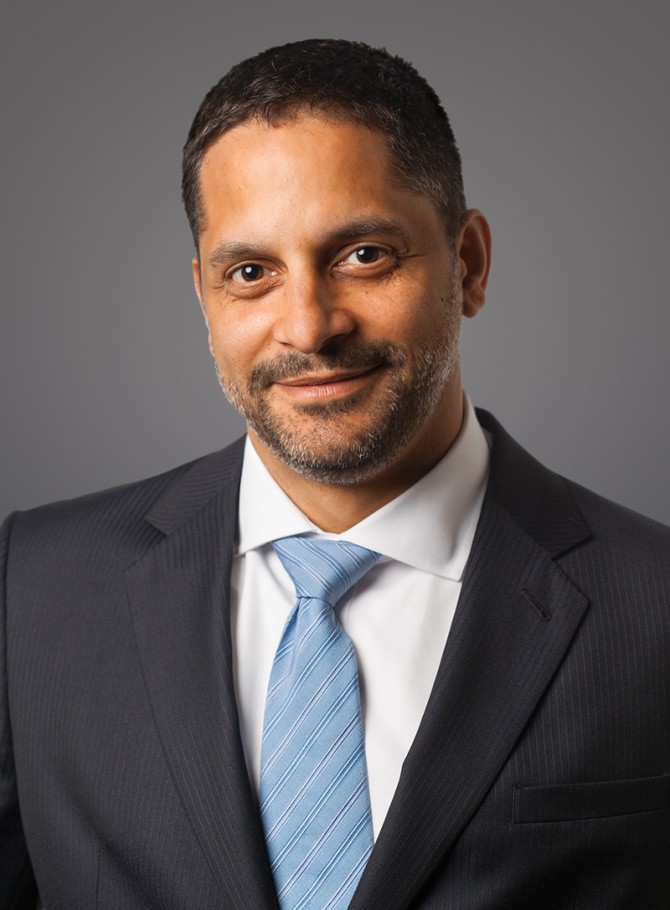Eduardo Peñalver reappointed Law School dean
By Joe Wilensky
Eduardo M. Peñalver ’94, the Allan R. Tessler Dean of Cornell Law School, has been appointed to a second five-year term as dean, beginning July 1, 2019.
The Cornell Board of Trustees’ Executive Committee voted May 24 to approve the reappointment. Peñalver is the 16th dean of Cornell Law School and was the first Latino dean of an Ivy League law school when he began his term in 2014.
“In the first four years of his tenure, Dean Peñalver has been an outstanding leader, recruiting and retaining the strongest students and the best faculty, and investing in key areas of technology law, enhanced legal clinics, and public access to legal information,” said Provost Michael Kotlikoff. “Under his leadership, Cornell launched the one-year Master of Laws degree in law, technology and entrepreneurship at Cornell Tech, markedly expanded legal clinic opportunities for students, and garnered new gifts and commitments for endowed professorships and expanded financial aid.”
“I am honored to be appointed to a second term as the Allan R. Tessler Dean of the Law School,” Peñalver said. “It’s hard to believe four years have already passed. I look forward to continuing to work with the Law School’s faculty, staff, students and alumni to continue our 130-year tradition of excellence.”
During Peñalver’s first four years as dean, Cornell Law School has continued to build on its rigorous educational program while pushing the boundaries of legal pedagogy.
In 2017, Cornell Law School ranked third in the nation for job placement, and 97 percent of the 2017 graduating class found full-time employment in positions requiring bar passage. Last year a record number – 57 – Cornell Law School students and alumni received clerkships.
The school is continuing to expand opportunities for students to pursue careers in public interest law. The Frank H.T. Rhodes Public Interest Law Fellowship, now entering its seventh year, has been joined by a new public interest fellowship named in honor of professor Robert Kent, funded by a gift from Robert D. Ziff, J.D. ’92, to support students pursuing careers in public service.
During Peñalver’s tenure, Cornell Law School has strengthened the credentials of each entering class while reducing its acceptance rate from 31 to 22 percent.
In addition to the two-year-old LL.M. program at Cornell Tech, the school also has begun offering J.D. students a semester of technology law-related courses at the Roosevelt Island campus, greatly expanding the school’s offerings in this field.
Over the past four years, Cornell Law School has raised $70 million in new gifts and commitments, including more than $25 million for financial aid, and funded three new endowed professorships.
Peñalver said he is particularly proud that the school, working with its alumni, has raised new endowment dollars and directed current-use resources to more than double total financial aid spending. This has allowed student debt levels to fall to their lowest level in many years (from an average of nearly $130,000 five years ago to approximately $85,000 for the school’s Class of 2018); a third of the Class of 2018 graduated without any debt, he said.
The school’s loan forgiveness program has been revamped to make it more comprehensive and easier to understand, Peñalver said: For any student earning less than $80,000 a year and working in a nonprofit or government law job, Cornell Law School will make the student’s loan payments; after 10 years, the federal government will forgive the remaining principal owed. As a result, there has been a dramatic increase in the number of students taking advantage of this program.
Also this past year, Peñalver served as one of the three co-chairs of the Presidential Task Force on Campus Climate, leading the Regulation of Speech and Harassment subcommittee.
Peñalver said his priorities for Cornell Law School for the next few years include establishing the new First Amendment Clinic and launching a new Technology and Innovation Clinic; building a professional development program focusing on collaboration; creating an online master’s degree program for nonlawyers focusing on technology and business law; growing the endowment in support of financial aid and faculty chairs; and continuing to deepen the school’s connections and partnerships with Cornell Tech.
Peñalver received his B.A. from Cornell’s College of Arts and Sciences in 1994 and his law degree from Yale Law School in 1999. He clerked for Judge Guido Calabresi of the U.S. Court of Appeals for the Second Circuit and for Supreme Court Justice John Paul Stevens. Between college and law school, Peñalver studied philosophy and theology as a Rhodes scholar at the University of Oxford. He first joined the Cornell faculty in 2006.
Media Contact
Get Cornell news delivered right to your inbox.
Subscribe

